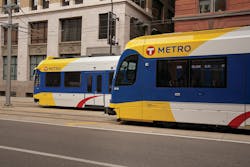MN: Metro Transit, Xcel Energy Team Up to Provide "Wind-Powered Trains" on Earth Day
Hiawatha light-rail trains are powered exclusively by wind energy today in recognition of Earth Day.
Using Xcel Energy’s Windsource program, Metro Transit has purchased about 71,000 kilowatt-hours of wind-generated electricity — about a day’s worth of the power required to operate the light-rail line. Annual light-rail ridership was the highest ever on the eight-year-old line in 2012 at 10.5 million.
Metro Transit and Xcel Energy officials commemorated Earth Day at a customer outreach and appreciation event today at Xcel Energy’s headquarters adjacent the Nicollet Mall light-rail station in downtown Minneapolis.
“Customers and communities recognize light rail as a clean transportation choice because there are no emissions from trains,” said Metro Transit General Manager Brian Lamb. “By teaming up with Xcel Energy this Earth Day, we are providing some 31,000 light-rail customers with emissions-free transportation today courtesy of Minnesota-farmed wind power.”
“Our Windsource program gives customers like Metro Transit the choice to use even more clean, renewable energy, in addition to Xcel Energy’s already clean energy mix,” said Judy Poferl, president and CEO of Northern States Power Co.-Minnesota, an Xcel Energy company. “Since the program began in 2003, Minnesota Windsource customers have supported the production of more than one billion kilowatt-hours of clean wind energy and have helped reduce carbon dioxide emissions in Minnesota by an estimated 1.6 billion tons.”
The “wind-powered train” is one component of Metro Transit’s six-year-old Go Greener initiative to conserve energy and reduce emissions. The Go Greener commitment includes the replacement of about 15 percent of Metro Transit’s bus fleet with hybrid-electric models and energy-saving capital investments at the agency’s six bus facilities. Together those efforts netted more than $4 million in fuel and utilities savings in 2012 as well as contributing to a cleaner, healthier Twin Cities environment.
Metro Transit and the Metropolitan Council were recognized with a Continuous Improvement Award by Governor Dayton last year for these and other energy and cost-saving initiatives.
